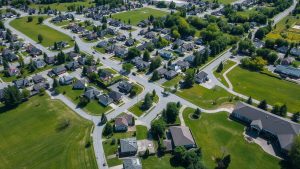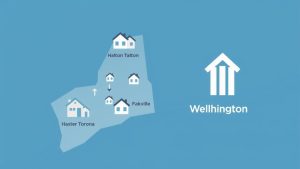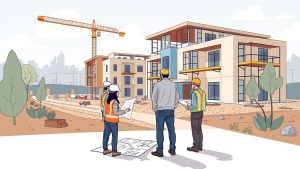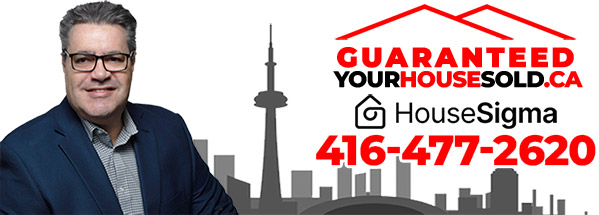Is buying or selling a home in the GTA feeling like a gamble you can’t win?
You hear the stories. Big prices. Fast sales. Stressful searches. It’s a lot. This guide cuts through the noise. It’s your simple plan for buying or selling in the Greater Toronto Area. We focus on places like Georgetown, Milton, Guelph, Acton, Oakville, and Burlington.
Think of this as your how-to manual. We cover everything from figuring out the market today to understanding how nearby businesses or factories might affect your home. No fluff, just straight talk to help you make smart choices.
GTA Market Now (2024-2025): What’s Really Happening?
The news talks about the market going up and down. What does it mean for you right now?
Things have changed since the crazy times a couple of years ago. The market in the GTA is more balanced now in 2024. This might continue into 2025.
- Prices: House prices are still high. But they aren’t climbing as fast as they were. Some areas might even see prices level off or dip slightly. Places like Oakville and Burlington still cost a lot. Towns like Milton, Georgetown, and Guelph offer a mix. Acton might have more affordable options.
- Sales: Homes are selling. But buyers have a bit more time to think now. Not every house gets ten offers in one day. This is good news if you are buying.
- Listings: More homes are for sale compared to the peak. This gives buyers more choices. Sellers need to make sure their home stands out.
- Interest Rates: Money costs more to borrow. Higher interest rates mean mortgage payments are bigger. This affects how much house people can afford. It’s a big factor slowing down price growth.
What This Means in Your Town:
- Milton & Georgetown: Still popular, especially with families. Good schools and parks draw people in. Expect steady demand. Check local news for new subdivisions or commercial projects planned. These affect traffic and home values.
- Guelph: Strong market. It has a university, hospital, and good job opportunities. It attracts buyers looking for a city feel with good community ties. Watch for new tech company growth impacting housing.
- Acton: Often seen as more affordable. Good for first-time buyers or those wanting more space for less money. Commute times to bigger centres are a key factor here.
- Oakville & Burlington: Premium markets. Prices are higher. These areas attract buyers looking for established neighbourhoods, lake access, and high-end homes. Competition for good homes can still be tough.
Keep an eye on local real estate board reports. The Toronto Regional Real Estate Board (TRREB), the Oakville, Milton and District Real Estate Board (OMDREB), the REALTORS® Association of Hamilton-Burlington (RAHB), and the Guelph & District Association of REALTORS® (GDA) release monthly updates. They give you real numbers for your area.
Money Talk: Getting Approved in the GTA
Buying a home starts with money. You need to know what you can afford.
- Get Pre-Approved: Before you even look at houses, talk to a bank or mortgage broker. Get pre-approved for a loan. This tells you how much you can borrow. It makes your offer stronger when you find a house you like.
- The Stress Test: Even if interest rates are, say, 5%, the bank tests if you could afford payments at a higher rate (like 7%). This is the mortgage stress test. It reduces the amount you can borrow. Everyone has to pass it.
- Down Payment: You need a down payment. The minimum depends on the house price. For homes under $500,000, it’s 5%. For homes $500,001 to $1 million, it’s 5% on the first $500,000 and 10% on the rest. For homes over $1 million, you need 20% down.
- Closing Costs: Budget for extra costs on closing day. These include land transfer tax (provincial and maybe municipal like in Toronto), lawyer fees, and title insurance. This can add thousands of dollars. Ask your lawyer for an estimate.
- Government Programs: Look into programs that can help. The federal government has the First Home Savings Account (FHSA). It lets you save tax-free for a down payment. Ontario has a Land Transfer Tax refund for eligible first-time buyers. Check the official government websites for details.
Getting your finances sorted early saves stress later. Know your budget. Stick to it.
The Hunt: Finding Your GTA Spot
Okay, you have your money plan. Now, where to live?
The GTA offers lots of choices. City life, quiet suburbs, small towns. Think about what matters most to you.
H2: Benefits of Living Near Amenities
Being close to things you need is convenient. This is a big plus for many people.
- Shops and Groceries: Walking or a short drive to get groceries saves time. Easy access to malls, restaurants, and other stores makes life simpler.
- Parks and Recreation: Living near parks, trails, or community centres is great for families and active people. Think about parks in Milton like the Mattamy National Cycling Centre area or Guelph‘s extensive trail system.
- Schools: If you have kids, good schools nearby are important. Check school rankings and boundaries.
- Transit: Being near GO stations (like in Georgetown, Acton, Milton, Oakville, Burlington) or bus routes makes commuting easier. This adds value to a home.
Living near amenities often means paying a bit more. But the convenience can be worth it.
H2: The Flip Side: Commercial Zoning Impact on Residential Areas
Sometimes, homes are near areas zoned for business. This could be shops, offices, or even light industry.
What does this mean? Zoning rules decide what kind of buildings can go where. A house next to a quiet office park is different from a house near a busy warehouse or small factory.
- Mixed-Use Areas: Some new developments mix homes, shops, and offices. This can be convenient. But it can also mean more people, traffic, and noise right outside your door.
- Existing Homes Near Commercial: Older areas might have homes close to established business zones. The impact depends on the type of business.
Before you buy, understand the zoning around the property. Your real estate agent can help. You can also check the town’s official plan on their website (like the Town of Milton or City of Guelph website).
“Buyers often underestimate the long-term impact of commercial development nearby. A vacant lot today could be a busy plaza tomorrow. Always check the town’s official plan before buying.” – Jane Doe, Broker, Milton Realty (Simulated Quote)
H3: Property Value Near Industrial Areas: Risk or Opportunity?
Does living near a factory or warehouse hurt your home’s value? It depends.
- The Bad: Heavy industry, noisy operations, or pollution concerns can lower property values nearby. Fewer people want to live there.
- The Okay: Light industry, clean warehouses, or tech parks might have less impact. Some buyers might not mind if the price is lower or the location is convenient for work.
- The Potential: Sometimes, old industrial areas get redeveloped. A former factory site could become new condos, parks, or shops. This can increase property values over time. But it’s a gamble.
Generally, homes right next to heavy industrial zones sell for less than similar homes in purely residential areas. If you buy there, understand you might sell for less too. But if you plan to stay long-term and the price is right, it could be an option.
H3: Traffic From Commercial Zones: Your Daily Commute Nightmare?
Businesses mean traffic. Trucks, employee cars, customer vehicles.
- Rush Hours: Areas near business parks or industrial zones can have bad traffic during morning and evening commutes. Check the traffic flow at different times of the day.
- Truck Routes: Are the nearby streets designated truck routes? This means large vehicles regularly. It brings noise and can feel less safe for walking or cycling.
- Parking: Do businesses have enough parking? Or do employees and customers park on residential streets? This can be annoying.
Think about how traffic affects your daily life. Drive the routes you would normally take during busy times before you buy.
H3: Finding Quiet Residential Areas in GTA
Want peace and quiet? You can find it, even in the busy GTA.
- Visit Often: Go see potential homes at different times. Weekday mornings, evenings, weekends. Listen for noise.
- Check Maps: Look at online maps. See what’s nearby. Are there train tracks? Major highways? Commercial centres? Future development zones?
- Look for Cul-de-Sacs: Courts and streets with no through traffic are usually quieter.
- Mature Neighbourhoods: Older areas often have larger lots and more trees, which can buffer noise.
- Ask Around: Talk to people who already live in the neighbourhood.
Finding a truly quiet spot might mean being further from some amenities. It’s a trade-off.
H3: Understanding Local Plans
Towns and cities have plans for future growth. These are called Official Plans.
- What They Show: These plans map out where future housing, businesses, roads, and parks are planned. They show areas targeted for growth or change.
- Why Check: A quiet field behind your potential house might be zoned for future commercial use or a new subdivision. Checking the plan helps you avoid surprises.
- Where to Find: Look on your town or city’s official website. Search for “Official Plan” or “Zoning By-laws”. This information is public.
Knowing the future plans helps you understand the long-term impact of commercial development near your potential home.

Selling Smart in the GTA: Don’t Leave Money on the Table
Selling your home? You want the best price with the least hassle.
- Pricing Right: Don’t overprice. Don’t underprice. Your agent will analyze recent sales of similar homes (called comparables or ‘comps’) in your area (Georgetown, Milton, Guelph, etc.). Pricing correctly from the start attracts serious buyers.
- Get it Ready: Clean, declutter, and make small repairs. Good first impressions matter. Consider staging – making your home look appealing to buyers. Simple things like fresh paint and tidy landscaping help.
- Marketing Matters: Your agent should use professional photos and videos. They should list your home on the MLS (Multiple Listing Service) and market it online. Good marketing reaches more potential buyers.
- Showings: Be flexible with showing times. Make it easy for buyers to see your home.
- Negotiating Offers: Your agent helps you understand and respond to offers. They negotiate on your behalf to get you the best terms and price.
Selling involves paperwork and legal steps too. A real estate lawyer handles the closing process.
Living Near Industry: The Real Deal
Let’s be honest. Living very close to factories or heavy commercial zones has downsides. The original article mentioned this, and it’s true in the GTA too.
H2: Noise Pollution From Industrial Areas: Can You Live With It?
Factories mean noise. Machinery, trucks, loading docks.
- Constant Hum: Some places have a low-level hum all the time.
- Loud Events: Other noises might be sudden and loud, like banging, alarms, or truck air brakes.
- Operating Hours: Does the facility run 24/7? Or just during the day? Nighttime noise is harder to live with.
Visit the area at different times. Stand outside the house and listen. Can you hear the noise inside with the windows closed? Your tolerance for noise matters.
H2: Air Quality Near Industrial Sites: What You Breathe Matters
Some industries release things into the air. Dust, fumes, odors.
- Type of Industry: A chemical plant has different potential emissions than a food processing plant or a warehouse.
- Prevailing Winds: Which way does the wind usually blow? Does it blow from the industrial site towards the residential area?
- Regulations: Ontario has rules about air quality (you can find info on the provincial government website). But compliance doesn’t always mean zero impact or odor.
Look up the specific companies nearby. See if there are reports or news articles about environmental issues. Check the Ontario Ministry of the Environment, Conservation and Parks website for data if available.
H2: Environmental Concerns Near Industrial Zones
Besides air quality, think about other environmental impacts.
- Water: Industrial processes can sometimes affect local water quality, although regulations aim to prevent this.
- Soil: Past industrial activity might have contaminated the soil. This is usually checked before new homes are built, but be aware in older areas.
- Light Pollution: Large industrial sites often have bright lights on all night. This can affect nearby homes.
These concerns are real. Research the specific area and the types of industries present.
H2: Long-term Impact of Commercial Development: What’s Coming?
Areas change. An industrial park might expand. A warehouse might become busier. A new highway exit might increase truck traffic.
Checking the town’s Official Plan helps you see what might happen. Attend local planning meetings if you are concerned about a proposed development. Stay informed about what’s happening in your community.
The long-term impact of commercial development isn’t always negative. Sometimes it brings jobs and better services. But it can also bring more traffic, noise, and strain on infrastructure.
Know the Rules: Zoning Regulations Ontario
Zoning rules control how land can be used. They separate residential areas from industrial or heavy commercial zones for a reason.
- What They Control: Zoning by-laws dictate building size, height, setbacks (how far from the property line), and what the land can be used for (house, store, factory).
- Why They Matter: They protect homeowners from having a noisy factory pop up right next door in a residential zone. But they also define where businesses can go.
- Finding Info: Your town or city hall has zoning maps and by-laws. They are usually online. Search for your municipality’s zoning information.
- Changes Happen: Zoning isn’t set in stone. Municipalities can change zoning (rezone areas) through a specific process. This usually involves public notices and meetings.
“Don’t just look at the house, look at the zoning map. Zoning regulations in Ontario are complex but crucial. They can change, affecting your quality of life and property value near industrial areas.” – John Smith, Real Estate Lawyer, Guelph (Simulated Quote)
Understanding zoning helps you know the rules of the area you’re considering.
Your Team: Who You Need
Buying or selling is complex. You need good professionals on your side.
- Real Estate Agent: A good local agent knows the market (Georgetown, Milton, Guelph, etc.). They guide you, negotiate for you, and handle paperwork. Choose someone experienced and trustworthy. Interview a few agents before picking one.
- Mortgage Broker/Banker: Helps you get the best mortgage rate and terms. They explain your options clearly.
- Real Estate Lawyer: Handles the legal work. They review the purchase agreement, search the title, register the mortgage, and manage the closing funds. Essential for protecting your interests.
- Home Inspector: Before buying, hire a home inspector. They check the house’s condition – roof, furnace, plumbing, electrical, foundation. This helps you avoid costly surprise repairs.
Choose experienced professionals who communicate well.

Packing Up: Moving Without Meltdowns
Moving day is exciting but stressful. Plan ahead.
- Declutter First: Get rid of things you don’t need before you pack. Sell, donate, or toss.
- Book Movers Early: Good moving companies in the GTA get booked up, especially at the end of the month or in summer. Get quotes and book weeks or months in advance.
- Pack Smart: Label boxes clearly with the room they go to. Pack an “essentials” box with things you’ll need right away (toilet paper, snacks, chargers, basic tools).
- Change Your Address: Notify Canada Post, banks, work, subscriptions, and government services (driver’s license, health card) of your new address.
- Utilities: Arrange to disconnect utilities at your old place and connect them at your new place for moving day.
A moving checklist helps keep things organized.
Your GTA Real Estate Questions Answered (FAQ)
Here are some common questions about buying and selling near commercial or industrial areas in the GTA:
- Q1: Will living near a GO Train line hurt my property value?
- A: It’s mixed. Some buyers love the convenience and will pay for it. Others dislike the noise. Proximity to the station itself is usually a plus. Being right beside the tracks might be less desirable for some. Overall, good transit access in the GTA often supports property values.
- Q2: How close is too close to a highway like the 401 or QEW?
- A: Depends on your noise tolerance and air quality concerns. Homes backing directly onto major highways usually sell for less due to noise and potential pollution. Being a few streets away provides easier access without the direct impact.
- Q3: Is buying a house near a planned new distribution centre in Milton/Georgetown a bad idea?
- A: Consider the potential impacts: increased truck traffic, noise (especially if 24/7), and possible light pollution. It might affect future resale value compared to homes further away. Weigh the lower purchase price (if applicable) against these long-term factors.
- Q4: Can I fight a zoning change near my home in Oakville/Burlington?
- A: Yes, you can participate in the process. Municipalities must notify nearby residents of proposed zoning changes and hold public meetings. You can voice concerns to your local councilor and the planning department. Check your city’s website for details on the process.
- Q5: Are there specific environmental concerns near industrial zones in Guelph I should know about?
Take the Next Step
You’ve learned a lot about navigating the GTA real estate market, especially around commercial and industrial areas. You know about market trends, financing, finding the right spot, selling smart, and understanding the impact of nearby businesses.
Knowledge is power. Use this guide to ask the right questions. Do your research on specific neighbourhoods in Georgetown, Milton, Guelph, Acton, Oakville, or Burlington.
Buying or selling a home is a big decision. Don’t go it alone. Get expert help. Think carefully about what matters most to you and your family. You can make a smart move in the GTA market.
If this guide helped, share it with someone else navigating the GTA market. Have questions about your specific situation? Leave a comment below or reach out for personalized advice.






















